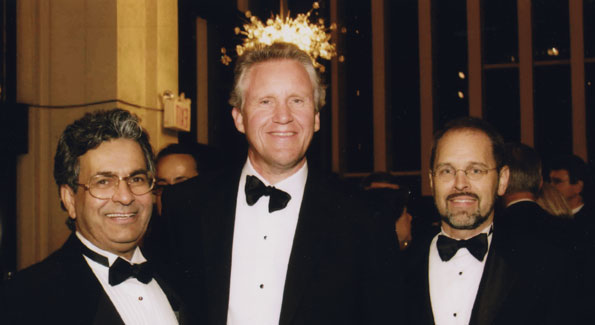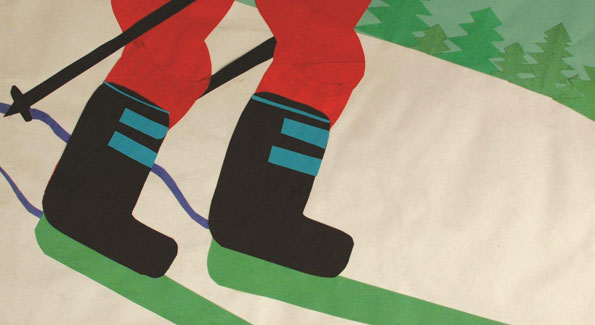The International Child Art Foundation “Olympics” unleashes children’s creativity and empathy through art, creating hope for a non-violent world.
By Jane Hess Collins

Dr. Ashfaq Ishaq, Jeff Immelt, CEO/Chairman of General Electric, and Peter Tichansky, President/CEO, Business Council for International Understanding
What if it didn’t take G-8 summits and suits to create a peaceful world? What if all it took was the permission to be empathetic and creative, with a little social media thrown in?
The fourth World Children’s Festival, held on the National Mall from June 17 – 19, celebrates how the power of kids, art and collaboration can bring global peace.
Empathy and creativity are preconditions for a more just, prosperous and non-violent world, according to Dr. Ashfaq Ishaq, founder of the International Child Art Foundation (ICAF). By encouraging those traits in kids ages 8-12, he says, we can grow a more collaborative, creative generation.
That age group is important, Ishaq says, because of the “fourth grade slump” phenomena identified by researchers decades ago. Right around that grade, or when kids are about nine years old, their creativity drops dramatically as they start conforming to please their parents and teachers. Standardized testing and acceptance start to replace unrestricted creativity.
It’s like, Ishaq said, building little walls to bound imagination.
Enter Arts Olympiad, ICAF’s four-year recurring program to introduce innovative, uninhibited artistic freedom to elementary schoolers. Focusing on the division between the athletic and non-athletic kids, who have already self-identified at that age, Arts Olympiad encourages non-athletic kids to visualize and engage in physical activity through art. The athletic kids, meanwhile, are encouraged to be imaginative and creative.
Deliberately structured to block out adult influence, Arts Olympiad is introduced to public and private schools, after-school programs, orphanages, juvenile detention centers, home-schoolers, arts foundations and national ministries of education throughout the world.
Designed to combat “creativity risk” as Ishaq puts it, the kids create their works of art without adult supervision, and by unleashing their freedom, they are free to be as original as their imagination allows.
In year three of each Arts Olympiad cycle, the winners from every state and the District of Columbia begin collaborating with some of the most creative kids on the planet through Skype and other social media.

Arts Olympiad drawing by Natalie Gates, age 9, a winner of the Virginia Arts
Selecting the most original and innovative is not an easy task. “Every child’s artwork is unique,” Ishaq said. While evaluators look for novelty and originality, Ishaq adds that “It’s amazing how creative these children are, and you can see it in their artwork that is exhibited on the Mall.”
But it’s not just about the art. Empathy and creativity are children’s issues, not art issues, Ishaq noted. “Children instinctively know how important it is for them to be creative, and they instinctively know they have to have empathy for the other in a globalized world.”
Ishaq believes that unleashing creativity and empathy is essential to keeping America globally competitive. America has, proportionately, less creative people than ever. Only one percent of our scientists and engineers invent. Art creates a strong learning path to empathy. That, along with creativity, leads to successful learners and leaders. For this reason alone, Ishaq said, education needs to imbed those traits into its curriculum. The skills to invent, discover and innovate will follow naturally.
Over 100 Arts Olympiad winners from 32 states and 61 countries will be joined by 600 performing artists and over 100 American and international educators, field experts, and trainers during the World Children’s Festival. While the three-day event is a celebration of the imagination of children, everyone can learn something and be inspired by what children can do with a little artistic freedom and internet connectivity.
Ishaq believes that this ability to connect and co-create globally has the potential to reignite American ingenuity and move towards global peace.
The Arts Olympiad isn’t ICAF’s only endeavor to leverage art for good. The Healing Arts Program, created in December of 2004 in response to the Asian tsunami, uses art to allow children to re-accept and trust nature after the child has survived a natural disaster. This program has also been implemented in the Gulf Coast and Chile. The Peace through Art program, developed in response to 9-11, uses empathy and creativity to allow victimized children to visualize their tormentors as fellow human beings.
Ishaq estimates that over five million kids worldwide have been served through ICAF’s three programs, including one million children in China alone participating in the Arts Olympiad.
And the best part about the World Children’s Festival, aside from enjoying the art, performances, activities and workshops? They’re looking for a few good volunteers to help with everything from bloggers to stage hands to host families.
Click here for details.
See you on the Mall next weekend.
Jane Hess Collins helps and encourages people to give back through her volunteering, writing, speaking, coaching and workshops. You can follow Get Out and Give Back on Facebook, Twitter and her website.
